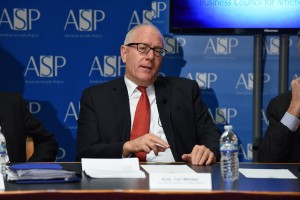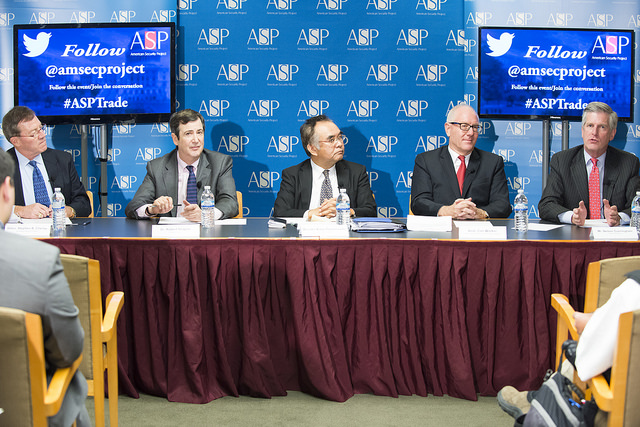
Event Review: TPP- The Implications of the Trans-Pacific Partnership for Global and Regional Stability
On Thursday, November 19th American Security Project hosted “TPP: Implications of the Trans-Pacific Partnership for Global and Regional Stability.”
The conversation included Ambassador Carl Worker, Charge d’Affaires at the New Zealand Embassy; BGen. Stephen A. Cheney, USMC (Ret), CEO of American Security Project; Minister Kanji Yamanouchi is Minister for Economic Affairs, Embassy of Japan; and Dr. Rob Shapiro, CEO of Sonecon.
Nelson Cunningham, President of ASP’s Board of Directors and McLarty Associates moderated the event.
ASP Board member Congressman Don Beyer was scheduled to deliver the keynote address. However, a House vote regarding the Syrian refugee crisis prevented him from joining the event.
Congressman Beyer will speak on the geopolitical and security impacts of TPP at American Security Project in the near future with a date to be released in coming weeks.
The event began with opening remarks from Mr. Cunningham underscoring the importance of understanding the nonpartisan geopolitical underpinnings of TPP as a “long-term, strategic move.”
Ambassador Worker spoke first, remarking on New Zealand’s long history of free trade categorized as, “an unswerving commitment.” ‘The advantages of free trade are not to be denied,” he continued. “Asia-Pacific is the center of world economic growth. As a coalition of the willing, TPP is about setting global standards for the future.”
Minister Yamanouchi spoke next, calling “TPP the most advanced and comprehensive agreement of this scale… the most high standard trade deal ever agreed upon”, shared these sentiments. 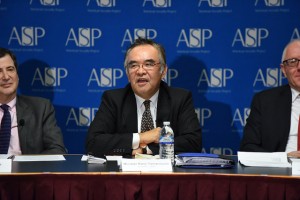
Acknowledging its imperfections, Yamanouchi likened TPP to his favorite Rolling Stone’s song.
“You can’t always get what you want. But in this case, we have all gotten more of what we need for the future. That’s the nature of negotiations, but on a whole TPP is good and we should be proud…[It] is the second best option. The best choice would have included China.”
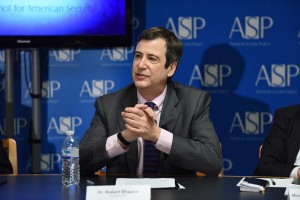
Dr. Rob Shapiro, former Undersecretary of Commerce followed Minister Yamanouchi. “National security policy is the dominant paradigm in the advancement of trade policy. The agreement has very profound implicit and explicit security components,” Shapiro stated.
However, he continued, “the security effects of trade agreements heavily rely on public support for trade agreements.” Shapiro closed by arguing that for the positive security impacts of TPP to come to fruition, “ we must identify the actors that are making it so difficult to pass trade agreements” and confront them.
BGen. Stephen A. Cheney, USMC (Ret.) CEO of American Security Project spoke last. “TPP provides the stability equivalent of 10 carrier battle groups in the Asia-Pacific.” He argued the implementation of mutually agreed upon norms on issues ranging from state-owned enterprise given the region’s history is of no small importance.
“The United States abides by all of the tenants of the Law of Sea, but has still failed to ratify the agreement, despite the continued importance of maritime security- particularly in the South China Sea. It is my hope that TPP opens the door for this to change,” he continued.
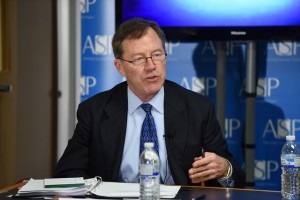 General Cheney then addressed the impact of TPP on China, despite its obvious absence from the agreement.
General Cheney then addressed the impact of TPP on China, despite its obvious absence from the agreement.
Required protections on unionization and restrictions on carbon emissions with a focus on clean, renewable energy technologies were not concessions China’s government was prepared to make. However, TPP represents 40% of the world GDP. In the medium to long term, China’s desire for continued access to these markets will force them to take a seat at the table- unions and all.
Throughout the discussion, the panelists continued to call attention to TPP as a set of rules meant to support stable and sustainable economies. As Ambassador Worker said, “TPP is all about rules. Clear, enforceable and transparent rules.” This structure is a key component of the agreement’s security impacts.
Rule of law is an absolute requirement for a healthy, just, and secure society. TPP not only presents minimum standards for anti-corruption, consumer protection, competition, intellectual property rights and other issues- it sets in place implementation and cooperation measures that surpass any existing free trade deal of this scale.TPP is not a perfect agreement, but its status as the most advanced deal of its kind is undeniable.
Security gains are just as important as economic ones, and in the case of TPP, the US benefits from both. The potential failure to ratify the agreement for what Mr. Cunningham described as; “purely political and partisan reasons” would strip the US of these benefits and leave leadership of the Asia-Pacific up for grabs. This is not a chance worth taking.
Further Reading
National Security Leaders Back TPP
TPP: A Matter of National Security
Africa- Promoting Investment and Extending National Security

